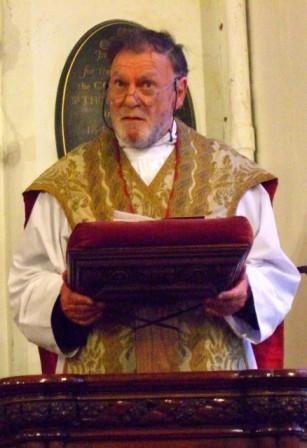Jeg har skrevet om at messen er et offer mange ganger tidligere, og her tar jeg med et stykke skrevet om dette temaet av Fr John Hunwicke – tidligere anglikansk prest, nå i Ordinariatet i England. Han skriver mye interessant på sin blogg – nesten noe nytt hver dag – og her er det han skrev for et par dager siden:

The central purpose of the Mass … even before the ‘Supper’ aspect … is sacrifice. Do you feel any little doubts lurking on the outskirts of your mind about this proposition?
Doubt 1: Why did S Paul call the Eucharist the Lord’s Supper (kyriakon deipnon)?
But deipnon, Supper, is, surprisingly to us, sacrificial language. In the Greco-Roman world, sacrifice was a communal activity. After the animal was killed and the prescribed portions sacrificially burned, the rest was cooked and eaten by the worshippers in a supper which was not just a sequel but was an integral part of the sacrificial ritual (what the Jews called a Communion Sacrifice). Many such invitations have come to light in the rubbish dumps of ancient Egypt, preserved by the dryness of the desert sand. … That is why so many excavated temple complexes have dining rooms and extensive kitchen areas attached to them; although sometimes the sacrificial banquet happened, like Christian Eucharist, in a private home (when this happened, the phrase in the papyri is en tei idiai oikiai). And it is one reason why S Paul is so concerned about his Corinthian converts partaking «in the tables of demons». To do so is to share in the pagan sacrifice. Look at I Cor 10:14-22 and note the parallelism the Saint draws between pagan sacificial banquets and the sacrificial banquet which is the Eucharist. Kyriakon deipnon certainly did not, as liberals like to assume, mean some informal sort of matey event («an expression of fellowship») or a plate in front of the television during Channel Four News.
Doubt 2: Did Jesus really have the Holy Sacrifice of the Mass and its sacrificial theology in mind when he sat at table with his disciples hours before his death?
Jacob Neusner powerfully argues that he did … [New Testament Studies 1989 pp287-290] Jacob Neusner? Who’s he? He’s a very distinguished and learned rabbi and academic expert on first century Judaism and Christian origins.
Oh yes? So why didn’t I hear about him when I was doing New Testament Studies? Because his researches often give strong support to the Catholic and Orthodox Faith from an academic, non-Christian, Jewish standpoint. Your mentors, careful men, naturally wanted to spare you such explosive material, and anyway they were far too busy teaching you about the Synoptic Problem, the Historical Jesus, the non-physical nature of the Resurrection, and the inauthenticity of most of S Paul’s letters.
But you can’t expect me to take seriously what a Jewish scholar thinks about Jesus. I don’t see why not. Pope Benedict did. In the first volume of his Jesus of Nazareth, the entire section on the Sermon on the Mount was indebted to an analysis by Neusner. And Neusner, in another brilliantly argued piece, shows that the reason why our Lord ‘cleansed’ the Temple on the first Palm Sunday was to denote the termination of the Jewish sacrificial system (particularly the offering of the tamid lamb, morning and evening, for the People; their Temple taxes, paid in Temple shekels acquired from the money-changers, went to provide the lambs) because he purposed, on Maundy Thursday, to replace it with his own sacrifice of the Eucharist: Table in place of Table, Sacrifice in place of Sacrifice.
